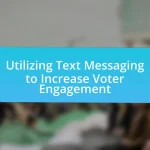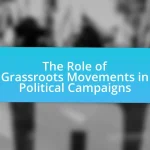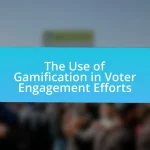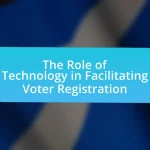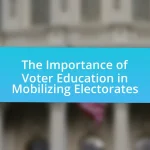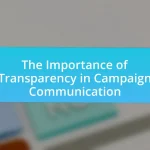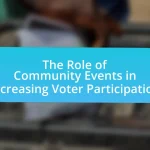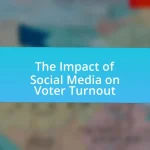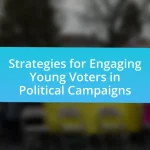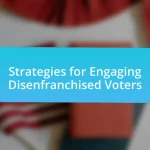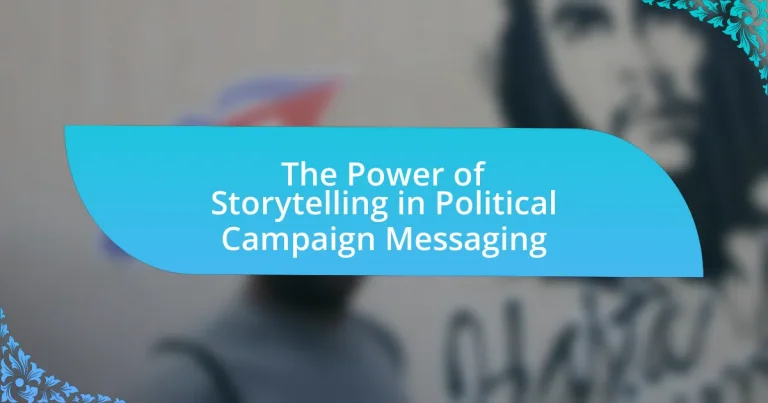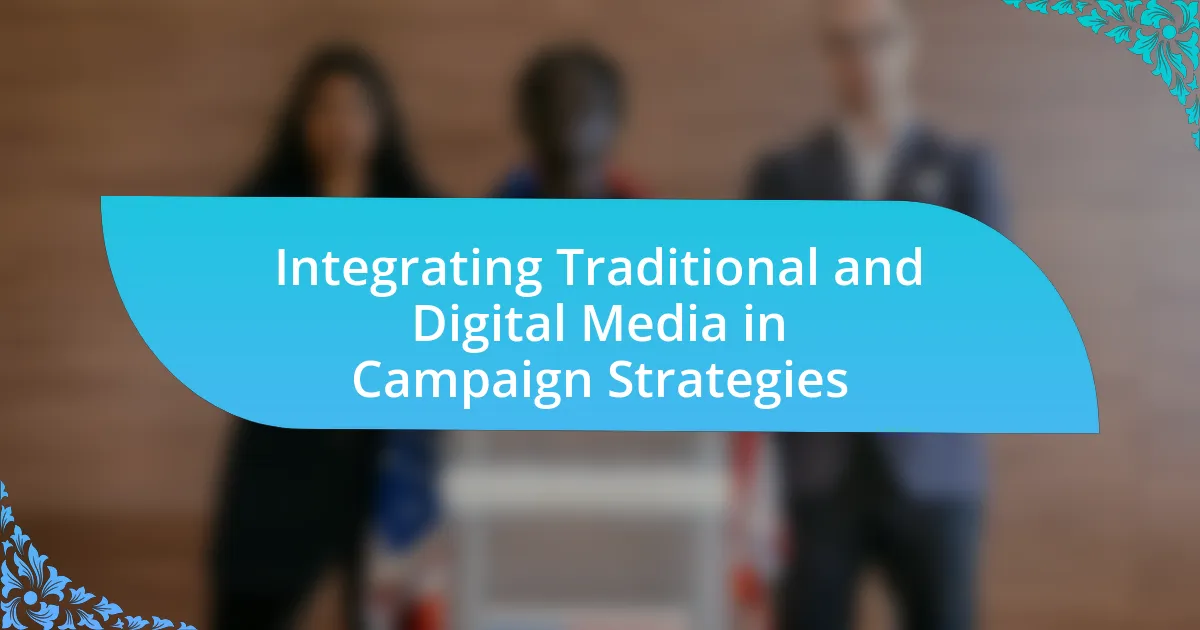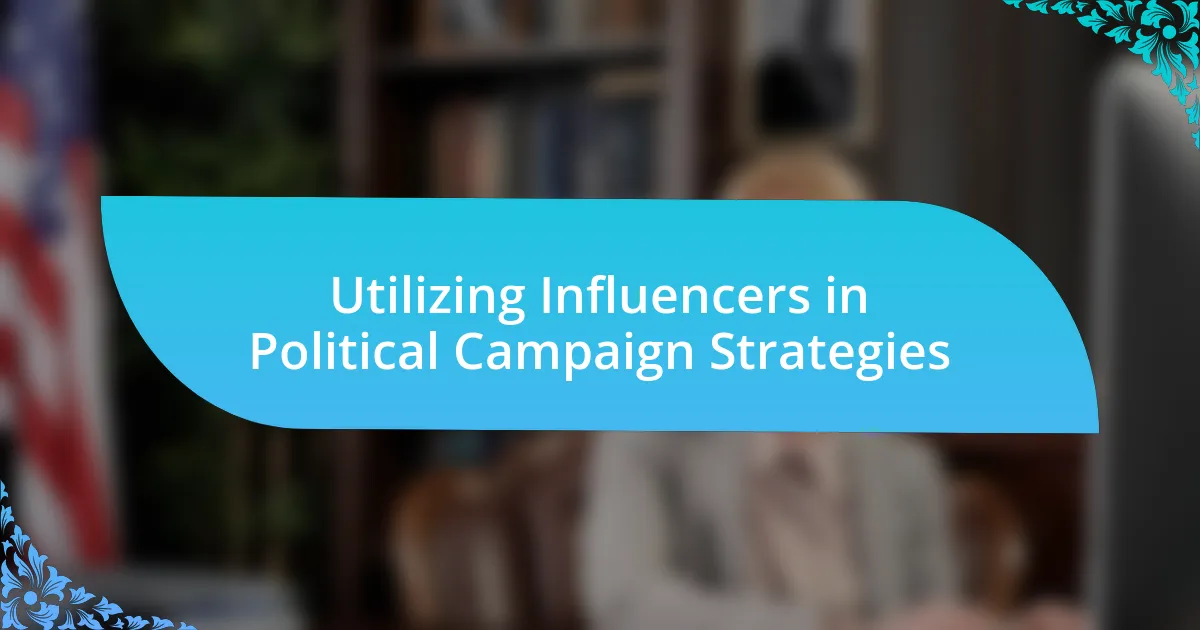The main entity of the article is the power of storytelling in political campaign messaging. The article explores how storytelling creates emotional connections, enhances voter perception, and simplifies complex political ideas, making them more relatable. It discusses the psychological mechanisms at play, the significance of conflict and resolution in narratives, and the importance of tailoring stories to diverse audiences. Additionally, it addresses the challenges and pitfalls of storytelling, including oversimplification and misleading narratives, while providing best practices for candidates to effectively engage voters through impactful storytelling.
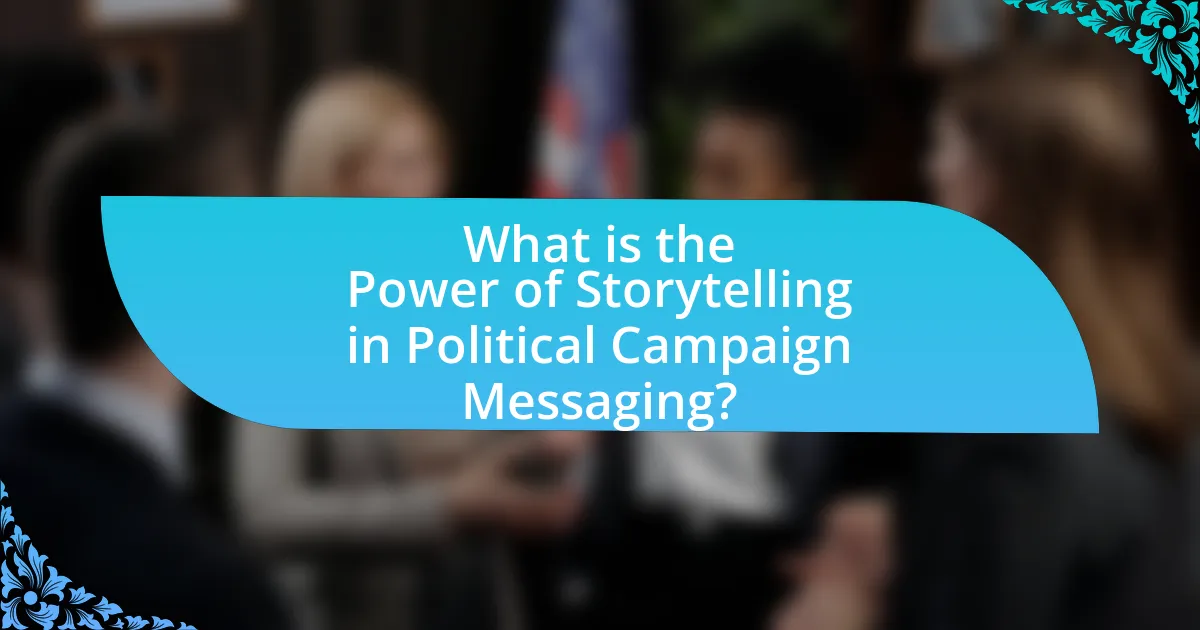
What is the Power of Storytelling in Political Campaign Messaging?
The power of storytelling in political campaign messaging lies in its ability to create emotional connections and convey complex ideas in relatable ways. Storytelling engages voters by presenting candidates as relatable individuals with shared values and experiences, which can significantly influence public perception and voter behavior. Research indicates that narratives can enhance memory retention and persuasion; for instance, a study published in the journal “Political Psychology” found that voters are more likely to remember and be influenced by candidates’ stories than by mere facts or statistics. This effectiveness stems from storytelling’s capacity to simplify political messages, making them more accessible and impactful for diverse audiences.
How does storytelling influence voter perception?
Storytelling significantly influences voter perception by creating emotional connections and enhancing relatability to candidates and their messages. When political narratives are framed through personal stories, they resonate more deeply with voters, making complex issues more understandable and relatable. Research indicates that narratives can increase engagement and retention of information; for instance, a study by the University of California, Los Angeles, found that stories activate brain regions associated with emotion and empathy, leading to stronger voter alignment with the storyteller’s perspective. This emotional engagement can sway opinions and motivate voter turnout, demonstrating the powerful role of storytelling in shaping political landscapes.
What psychological mechanisms are at play in storytelling?
Storytelling engages several psychological mechanisms, including emotional resonance, cognitive processing, and social connection. Emotional resonance occurs when narratives evoke feelings, making the audience more likely to remember and relate to the message. Cognitive processing is enhanced as stories present information in a structured format, aiding comprehension and retention. Social connection is fostered through shared experiences and values depicted in stories, which can create a sense of belonging and influence attitudes. Research indicates that narratives can activate brain regions associated with empathy and understanding, further solidifying their impact on audience perception and behavior.
How does storytelling create emotional connections with voters?
Storytelling creates emotional connections with voters by presenting relatable narratives that resonate with their experiences and values. When political messages are framed as stories, they engage voters on a personal level, making complex issues more accessible and memorable. Research indicates that narratives can activate emotional responses in the brain, leading to increased empathy and understanding. For instance, a study published in the journal “Political Psychology” by Green and Brock (2000) found that individuals who were exposed to narrative messages were more likely to change their attitudes compared to those who received non-narrative information. This demonstrates that storytelling not only captures attention but also fosters a deeper emotional bond between candidates and voters, ultimately influencing electoral outcomes.
Why is storytelling essential in political campaigns?
Storytelling is essential in political campaigns because it effectively engages voters by creating emotional connections and simplifying complex issues. Political narratives allow candidates to present their values, experiences, and visions in a relatable manner, making it easier for constituents to understand and resonate with their messages. Research indicates that stories can increase retention of information by up to 22 times compared to facts alone, highlighting their impact on voter memory and decision-making. Furthermore, campaigns that utilize storytelling often see increased voter turnout, as narratives inspire action and foster a sense of community among supporters.
What role does storytelling play in differentiating candidates?
Storytelling plays a crucial role in differentiating candidates by enabling them to connect emotionally with voters and convey their values and vision effectively. This emotional connection fosters relatability, making candidates more memorable and distinct in a crowded political landscape. Research indicates that narratives can significantly influence voter perceptions; for instance, a study by the Pew Research Center found that candidates who share personal stories are perceived as more trustworthy and relatable, which can sway undecided voters. Thus, storytelling not only enhances a candidate’s appeal but also serves as a strategic tool for differentiation in political campaigns.
How can storytelling enhance message retention among voters?
Storytelling enhances message retention among voters by creating emotional connections that make information more memorable. When narratives are used in political messaging, they engage voters’ emotions and imagination, leading to better recall of key messages. Research indicates that stories activate different parts of the brain compared to facts alone; for instance, a study published in the journal “Cognitive Science” found that narratives can improve memory retention by up to 22 times. This is because stories provide context and relatability, allowing voters to see themselves in the narrative, which reinforces the message and increases its impact.
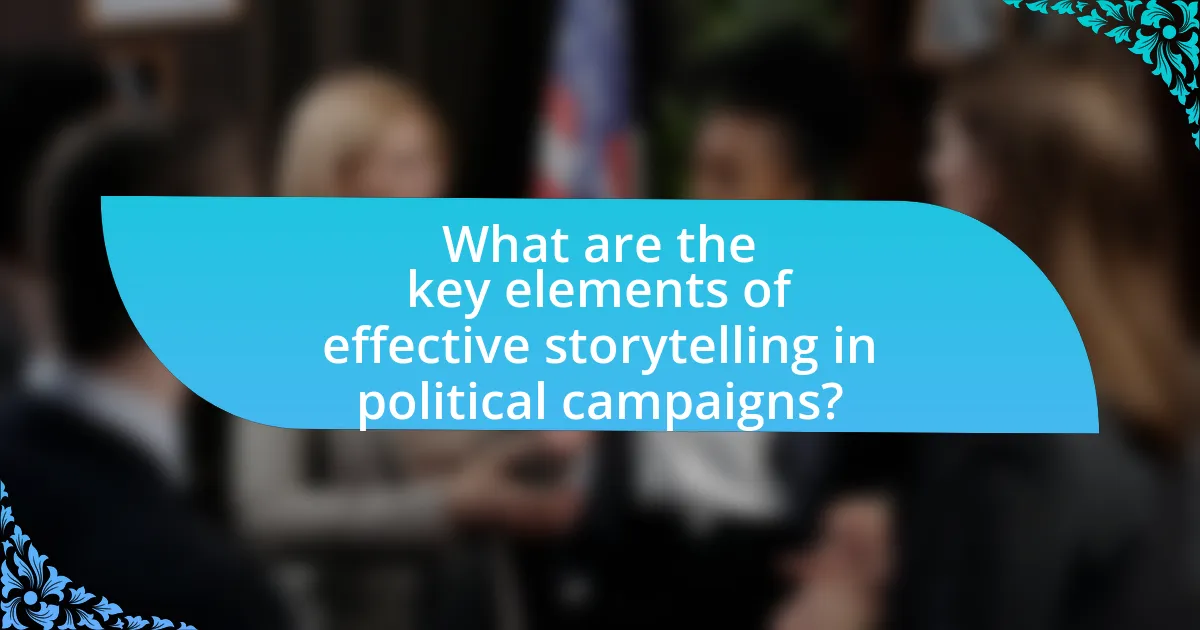
What are the key elements of effective storytelling in political campaigns?
The key elements of effective storytelling in political campaigns include a relatable protagonist, a clear conflict, emotional engagement, and a resolution that aligns with the campaign’s message. A relatable protagonist, often the candidate or a representative figure, helps voters connect personally with the narrative. The clear conflict illustrates the challenges faced by the community or the nation, making the stakes evident. Emotional engagement is crucial, as stories that evoke feelings can motivate voters to act, evidenced by studies showing that emotionally charged messages increase voter turnout. Finally, a resolution that aligns with the campaign’s message provides a hopeful vision for the future, reinforcing the candidate’s platform and encouraging support.
What narrative structures are most effective in political messaging?
Effective narrative structures in political messaging include the hero’s journey, problem-solution, and personal storytelling. The hero’s journey engages audiences by framing candidates as protagonists overcoming challenges, which resonates emotionally and builds relatability. The problem-solution structure clearly outlines societal issues and presents the candidate as the solution, enhancing clarity and urgency. Personal storytelling humanizes candidates, allowing voters to connect with their experiences and values, which has been shown to increase voter engagement and trust. Research indicates that narratives that evoke empathy and personal connection significantly influence voter behavior and decision-making.
How do personal anecdotes impact the effectiveness of a campaign story?
Personal anecdotes significantly enhance the effectiveness of a campaign story by fostering emotional connections with the audience. These narratives humanize the campaign, making complex issues relatable and memorable. Research indicates that stories with personal elements can increase persuasion by up to 50%, as they evoke empathy and create a sense of shared experience. For instance, a study published in the Journal of Communication found that voters are more likely to support candidates who share personal stories that resonate with their own experiences, demonstrating the power of storytelling in political messaging.
What is the significance of conflict and resolution in campaign narratives?
Conflict and resolution are crucial elements in campaign narratives as they drive engagement and emotional connection with the audience. Campaigns that effectively incorporate conflict highlight the challenges or issues faced by the community or the candidate, creating a relatable context. The resolution aspect showcases the candidate’s proposed solutions or vision for overcoming these challenges, thereby positioning them as a proactive leader. Research indicates that narratives featuring conflict and resolution can increase voter motivation and turnout, as they resonate on a personal level, making the political message more compelling and memorable. For instance, a study by the Pew Research Center found that emotionally charged stories significantly influence public opinion and voter behavior, underscoring the importance of these narrative elements in political messaging.
How can candidates tailor their stories to resonate with diverse audiences?
Candidates can tailor their stories to resonate with diverse audiences by understanding the values, experiences, and cultural backgrounds of those audiences. This involves conducting thorough research to identify key issues that matter to different demographic groups, such as economic concerns for working-class voters or social justice for minority communities. By incorporating relatable anecdotes and emphasizing shared values, candidates can create narratives that connect emotionally with various segments of the electorate. For instance, a candidate might share a personal story about overcoming adversity that aligns with the struggles faced by a specific community, thereby fostering a sense of empathy and relatability. This approach is supported by studies showing that storytelling enhances engagement and retention of information, making messages more impactful across diverse groups.
What strategies can be used to adapt stories for different demographic groups?
To adapt stories for different demographic groups, one effective strategy is to tailor the narrative elements to resonate with the specific values, beliefs, and experiences of each group. This involves conducting thorough audience research to understand cultural backgrounds, preferences, and communication styles. For instance, a study by the Pew Research Center indicates that younger audiences prefer digital storytelling formats, while older demographics may respond better to traditional media. Additionally, using relatable characters and scenarios that reflect the demographic’s daily life can enhance engagement and emotional connection. By incorporating these tailored elements, political campaigns can effectively communicate their messages and foster a sense of belonging among diverse audiences.
How does cultural context influence storytelling in political campaigns?
Cultural context significantly influences storytelling in political campaigns by shaping the narratives that resonate with voters. Political campaigns often tailor their messages to align with the values, beliefs, and experiences of specific cultural groups, ensuring that the stories told reflect the audience’s identity and concerns. For instance, a campaign may emphasize themes of community and family in cultures that prioritize collectivism, while focusing on individual achievement in more individualistic societies. Research indicates that campaigns that effectively incorporate cultural narratives can increase voter engagement and support; for example, the 2008 Obama campaign utilized culturally relevant stories to connect with diverse demographic groups, resulting in higher turnout rates among minority voters. This demonstrates that understanding cultural context is essential for crafting compelling political narratives that mobilize and resonate with the electorate.
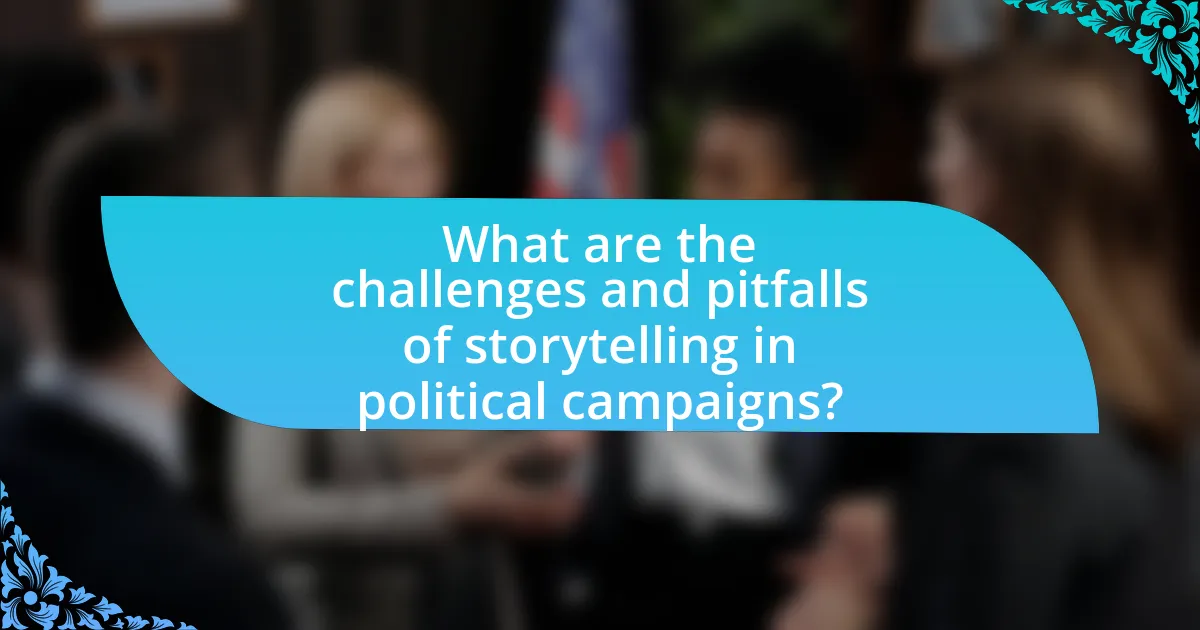
What are the challenges and pitfalls of storytelling in political campaigns?
The challenges and pitfalls of storytelling in political campaigns include the risk of oversimplification, misrepresentation of facts, and potential alienation of certain voter demographics. Oversimplification occurs when complex political issues are reduced to overly simplistic narratives, which can mislead voters about the realities of policy implications. Misrepresentation of facts can arise when stories are crafted to evoke emotional responses rather than accurately reflect the truth, leading to distrust among the electorate. Additionally, storytelling that fails to resonate with diverse voter groups can alienate segments of the population, resulting in a loss of support. For instance, a campaign that focuses solely on a single demographic’s experiences may overlook the concerns of others, ultimately weakening its overall message and effectiveness.
What common mistakes do candidates make in their storytelling efforts?
Candidates commonly make mistakes in their storytelling efforts by failing to connect emotionally with their audience. This disconnect often arises from overly complex narratives that lack clarity or focus, making it difficult for listeners to engage. Additionally, candidates frequently neglect to personalize their stories, missing the opportunity to relate their experiences to the values and concerns of their constituents. Research indicates that effective storytelling in political campaigns significantly enhances voter engagement, as evidenced by studies showing that emotionally resonant messages can increase voter turnout by up to 20%.
How can over-simplification undermine a campaign’s message?
Over-simplification can undermine a campaign’s message by distorting complex issues into misleading narratives. When a campaign reduces multifaceted topics to simplistic slogans, it risks alienating informed voters who seek depth and nuance. For instance, during the 2016 U.S. presidential election, the slogan “Make America Great Again” oversimplified economic and social challenges, leading to polarized interpretations that failed to address underlying issues such as income inequality and systemic racism. This lack of depth can result in a loss of credibility and trust among constituents, ultimately weakening the campaign’s overall effectiveness.
What are the risks of using misleading narratives in political storytelling?
The risks of using misleading narratives in political storytelling include the erosion of public trust, the polarization of society, and the potential for manipulation of voter behavior. Misleading narratives can lead to misinformation, which undermines informed decision-making among the electorate. For instance, a study by the Pew Research Center found that 64% of Americans believe fabricated news stories cause confusion about the basic facts of current events. This confusion can result in voters making choices based on false premises, ultimately skewing democratic processes. Additionally, misleading narratives can deepen societal divides, as individuals may gravitate towards information that reinforces their existing beliefs, leading to increased polarization. This dynamic can destabilize political discourse and hinder constructive dialogue.
How can candidates effectively measure the impact of their storytelling?
Candidates can effectively measure the impact of their storytelling by analyzing audience engagement metrics, such as social media shares, comments, and feedback. These metrics provide quantifiable data on how well the story resonates with the audience. For instance, a study by the Pew Research Center found that stories that evoke emotional responses are more likely to be shared, indicating a stronger impact. Additionally, candidates can conduct surveys or focus groups to gather qualitative insights on how their narratives influence voter perceptions and behaviors. This combination of quantitative and qualitative analysis allows candidates to assess the effectiveness of their storytelling strategies in political campaign messaging.
What metrics should be used to evaluate storytelling effectiveness?
To evaluate storytelling effectiveness in political campaign messaging, key metrics include audience engagement, emotional response, message retention, and conversion rates. Audience engagement can be measured through social media interactions, comments, and shares, indicating how well the story resonates with the audience. Emotional response can be assessed using surveys or sentiment analysis tools that gauge feelings elicited by the story. Message retention is evaluated through follow-up surveys or quizzes that determine how much of the story’s content the audience remembers. Conversion rates, such as the percentage of viewers who take a desired action (e.g., donating, volunteering, or voting), provide a direct measure of the story’s impact on behavior. These metrics collectively offer a comprehensive view of storytelling effectiveness in political contexts.
How can feedback from voters inform future storytelling strategies?
Feedback from voters can significantly inform future storytelling strategies by providing insights into what resonates with the electorate. Analyzing voter feedback allows campaign teams to identify key themes, emotions, and narratives that effectively engage their audience. For instance, a study by the Pew Research Center found that 65% of voters are influenced by personal stories that reflect their own experiences, indicating that campaigns can enhance their messaging by incorporating relatable narratives. By systematically gathering and analyzing this feedback, campaigns can refine their storytelling techniques to better align with voter values and concerns, ultimately increasing their effectiveness in future communications.
What best practices should candidates follow for impactful storytelling?
Candidates should focus on authenticity, emotional connection, and clarity for impactful storytelling. Authenticity ensures that the narrative resonates with the audience, as voters are more likely to trust candidates who present genuine experiences and values. Emotional connection engages the audience on a personal level, making the story relatable and memorable; studies show that stories that evoke emotions are more likely to be shared and remembered. Clarity in messaging allows the audience to easily grasp the candidate’s vision and values, which is crucial in political campaigns where complex issues are often simplified. By adhering to these best practices, candidates can effectively communicate their messages and foster a deeper connection with voters.
